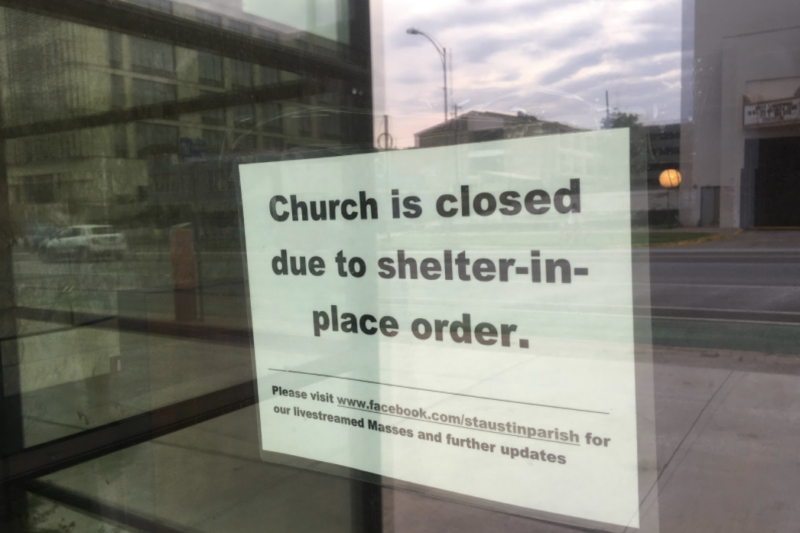Prayer in the Pandemic: Faith in West Campus Forced to Adapt
By Ryan Chandler
Photography By Ryan Chandler
Reporting Texas
 AUSTIN — Amid unprecedented rates of COVID-19 infections in Austin, religious organizations across faiths in West Campus have shut their doors and transitioned online to keep their communities together.
AUSTIN — Amid unprecedented rates of COVID-19 infections in Austin, religious organizations across faiths in West Campus have shut their doors and transitioned online to keep their communities together.
Associate pastor at St. Austin Catholic Parish Rev. Rich Andre, C.S.P. delivers mass every day to an empty hall, the pews only accompanied by his iPhone streaming on Facebook Live.
“Even though a few ministers are here at St. Austin receiving the Eucharist today, it’s just not the same without you,” Andre said through tears in the parish’s first live-streamed mass on March 22. Approximately 3,800 viewers joined him from across the country.
“[That] was our first virtual gathering, and almost everyone cried,” he said. “We decided we had to close [the parish] completely, which felt so wrong. Some people are still doing confessions with lines and have figured out how to do it safely, but we could not figure out how to do that.”
Bishop Joe Vasquez, who oversees the Austin diocese, removed the usual obligation for Catholics to attend mass and is encouraging church-goers to stay home. However, the reception from the Catholic community has been mixed.
Rev. Andre is receiving calls every day from parishioners requesting church services such as the Catholic sacraments of confession and communion, yet he worries for their safety. St. Austin draws attendees from 60 different ZIP codes, many of whom are elderly, and the parish does not believe it can deliver services in a safe way.
Texas Hillel, the Jewish student life center in West Campus, has also closed its doors. Their programming has transitioned entirely online and is using the video communications platform “Zoom” to host learning programs, guest speakers, and even yoga classes.
“There is a value in Judaism that saving a life supersedes everything else, so we’re going to operate with health and safety first in mind,” Executive Director of Texas Hillel Maiya Chard-Yaron said. “We’re trying to make it reasonable and easy for them to feel connected to Jewish life without having to break any kind of guideline… we’re not just packing up, we’re adapting.”
Islamic student life center Nueces Mosque has also transitioned to “Zoom” for regular services and lessons. Public Relations Director Hebah Tanveer, a freshman at The University of Texas, says the change has not damaged the community’s level of engagement.
“People are encouraging others to focus on their spirituality and using reminders that self-isolation is a great time to reflect,” she said. “People that were present in person are more present virtually… it’s inspiring to see community members encouraging other members.”
This pandemic strikes at an especially difficult time for these religious communities. April is the most special time of the year for each of these faiths – with Easter, Passover, and Ramadan all quickly approaching before the end of the month, they are stressing that it is more important than ever for their communities to stick together, even if they are apart.
“I can’t even imagine a virtual Ramadan,” Tanveer said. “Every single year I’ve been at the mosque for 30 nights, the whole month, getting to know everyone and focusing on my faith… now that everything has shifted away from that, it’s not hopeless, because the sense of community is still there.”
Rev. Andre calls this week “the Super Bowl of the Catholic Church’s liturgical year.”
“We have to keep guessing how that’s going to go together,” he said. “All of those celebrations are so important… even if they are going to be in fairly empty rooms.”
On March 19 Governor Abbott issued an executive order exempting religious services from mandatory closures, as long as they comply with social distancing requirements. Each of the organizations mentioned above have opted to remain closed, citing guidelines from leaders within their faith and concerns for attendees’ safety.
“We’re following many of the religious authorities within the Jewish community,” Chard-Yaron said. “In Judaism there’s a concept called a minyan, which is a quorum of ten adults that are needed to recite certain prayers… so that supersedes.”
Despite the uncertainty and distance the pandemic has forced upon these communities, each finds their own silver lining. Rev. Andre notes that even more people are attending mass online, and Tanveer remarks that the time alone could be an opportunity for her community to grow closer in their faith.
Across West Campus, each faith stands unified in a common commitment – health and safety is above all.
“We would not risk peoples’ lives by letting them gather, even though our liturgical celebration would be so much richer… we are confident it is not worth it,” Rev. Andre said. “The best way to love our neighbors right now is to stay apart from one another.”